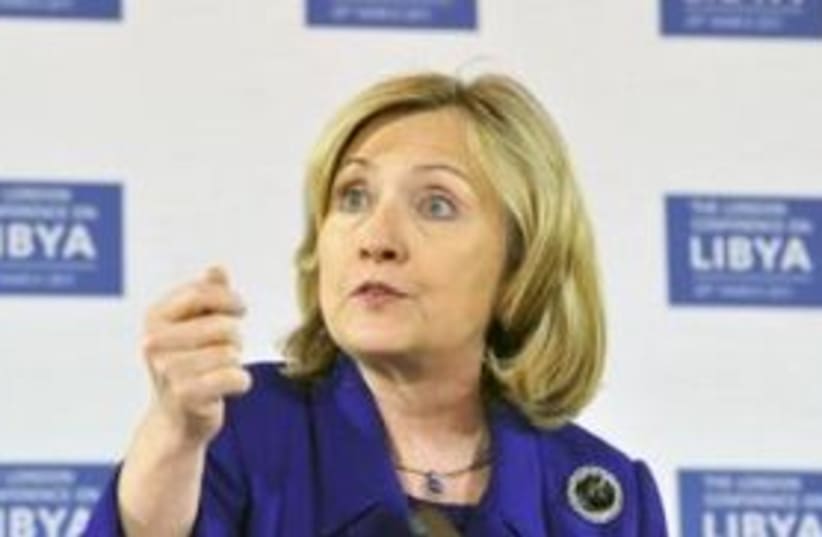RELATED:World leaders in Istanbul seek political solution for LibyaSyrian exiles call for army to side with peopleDefying the crackdown in Syria“And we, along with many others in the region and beyond, have said we strongly support a democratic transition.”She noted that US officials had conducted many conversations with counterparts concerning Syria during the course of the day.“We’ve made our views very clear, and the messages coming into Syria are remarkably similar, from everyone that I spoke with today,” she said.Clinton was responding to comments from new Arab League head Nabil Elaraby slamming “foreign interference” in the affairs of Arab countries and declaring that Syria’s governance is “exclusively decided by the people.”Elaraby had spoken at a news conference he held in Damascus on Wednesday after meeting with Assad.US President Barack Obama refrained until last week from calling Assad’s rule illegitimate, months after protesters began taking to the streets and paying with their lives.The Obama administration was much quicker to slap a similar label on the Libyan regime after leader Muammar Gaddafi began to kill civilians calling for an end to his rule.Administration officials said the discrepancy was in part because of the greater Arab support for challenging Gaddafi. Syria retains much stronger ties with Arab leaders, as demonstrated by Wednesday’s meeting.Meanwhile, Clinton said on Saturday that Turkey could serve as a democratic model for the Middle East but warned about Ankara’s efforts to limit media and restrict freedom of expression.Clinton, wrapping up a twoday visit to Turkey designed to smooth ties after a period of tension over Iran and other issues, said Turkey and the United States were natural allies on a range of global challenges.But she pointedly criticized Turkey on what she said were moves to jail journalists and impose new limits on freedom of expression in the country, which hopes for European Union membership.“People across the Middle East and North Africa are seeking to draw lessons from Turkey’s experience,” she said in an appearance with Turkish Foreign Minister Ahmet Davutoglu, saying it was important to protect both free expression and the rights of minorities.Earlier, during a televised media interview with a group of young people at an Istanbul coffee shop, Clinton said she was concerned by the crackdown, which has also sparked a rebuke by the Council of Europe.“I don't think it is necessary or in Turkey’s interest to be cracking down,” Clinton said.“It seems to me inconsistent with all the other advances that Turkey has made. As someone looking at it from the outside, I don't understand it.”Several Turkish journalists were detained this year in connection with an alleged plot to overthrow the government.Media watchdogs say about 60 journalists are in jail, many working for pro-Kurdish or leftist publications. The Council of Europe commissioner for human rights said in a report this week Turkey should take urgent measures to address a situation he called “particularly worrying.”Reuters contributed to this report.
Clinton says Arab League wrong to defend Assad
After Nabil Elaraby condemns "foreign interference in Syria," US Secretary of State reiterates Assad "has lost legitimacy in the eyes of his people."

RELATED:World leaders in Istanbul seek political solution for LibyaSyrian exiles call for army to side with peopleDefying the crackdown in Syria“And we, along with many others in the region and beyond, have said we strongly support a democratic transition.”She noted that US officials had conducted many conversations with counterparts concerning Syria during the course of the day.“We’ve made our views very clear, and the messages coming into Syria are remarkably similar, from everyone that I spoke with today,” she said.Clinton was responding to comments from new Arab League head Nabil Elaraby slamming “foreign interference” in the affairs of Arab countries and declaring that Syria’s governance is “exclusively decided by the people.”Elaraby had spoken at a news conference he held in Damascus on Wednesday after meeting with Assad.US President Barack Obama refrained until last week from calling Assad’s rule illegitimate, months after protesters began taking to the streets and paying with their lives.The Obama administration was much quicker to slap a similar label on the Libyan regime after leader Muammar Gaddafi began to kill civilians calling for an end to his rule.Administration officials said the discrepancy was in part because of the greater Arab support for challenging Gaddafi. Syria retains much stronger ties with Arab leaders, as demonstrated by Wednesday’s meeting.Meanwhile, Clinton said on Saturday that Turkey could serve as a democratic model for the Middle East but warned about Ankara’s efforts to limit media and restrict freedom of expression.Clinton, wrapping up a twoday visit to Turkey designed to smooth ties after a period of tension over Iran and other issues, said Turkey and the United States were natural allies on a range of global challenges.But she pointedly criticized Turkey on what she said were moves to jail journalists and impose new limits on freedom of expression in the country, which hopes for European Union membership.“People across the Middle East and North Africa are seeking to draw lessons from Turkey’s experience,” she said in an appearance with Turkish Foreign Minister Ahmet Davutoglu, saying it was important to protect both free expression and the rights of minorities.Earlier, during a televised media interview with a group of young people at an Istanbul coffee shop, Clinton said she was concerned by the crackdown, which has also sparked a rebuke by the Council of Europe.“I don't think it is necessary or in Turkey’s interest to be cracking down,” Clinton said.“It seems to me inconsistent with all the other advances that Turkey has made. As someone looking at it from the outside, I don't understand it.”Several Turkish journalists were detained this year in connection with an alleged plot to overthrow the government.Media watchdogs say about 60 journalists are in jail, many working for pro-Kurdish or leftist publications. The Council of Europe commissioner for human rights said in a report this week Turkey should take urgent measures to address a situation he called “particularly worrying.”Reuters contributed to this report.